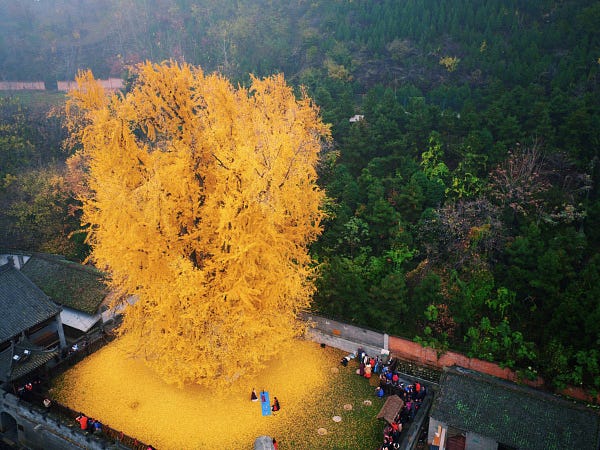14. what does a book proposal look like?
thinking about starting the task of publishing a book + uncanny valley
Hi there! 👋 I’m Ida, and this is tiny driver, a newsletter about research, pedagogy, culture and their intersections. Thank you for being here. Reply anytime, I love hearing from you.
Hello, and happy Monday to you. The leaves are finally changing color here in Chicago, and it is absolutely beautiful. I didn't grow up with the four seasons as a kid, so I always feel like one whenever I see a particularly vibrant tree this time of year.
What I write.

"What does a book proposal look like?"
This was the subject line of emails that I sent to my (former?! because I graduated?!) dissertation committee last week.
For those of you who are unfamiliar with academic-y things, let me contextualize.* Now that I have written my dissertation and graduated from my program, the next step is to turn said dissertation into a book. (This is particularly true for humanities disciplines. I feel like I've heard folks in STEM say that they are meant to publish articles, but for us, it's a single-authored book situation.) And this book is supposed to be published by a university press. And ideally (or so I've heard), one wants this book (or chapters of it, at least) to be assigned in undergraduate & graduate courses while also furthering the field. Whew.
Part of this process includes getting your book manuscript acquired by a university press and signing a book contract. The most common way of this happening is by submitting a book proposal to prospective editors at presses. The proposal is meant to serve as a way of letting them know what the book is about, what fields it speaks to, and the marketability (?!) of the subject. To get a book contract, one must (usually) have a book proposal. Right now, I'm working on the "book proposal" part of that equation.
Granted, I started drafting my book proposal a few weeks ago and I was using the Princeton University Press proposal guidelines as my North Star. But as I was tinkering around with my project description, I just kept thinking, "Am I doing this right? What is this? AhhhHHHHHH." So, I decided to ask for some more help & resources.
I can't say that I feel any more sure of myself and my work within the span of a week, but I wanted to share the resources I was given, as a way of hopefully starting conversations around demystifying the book proposal writing process. Aside from the Princeton UP page, I've also started to follow the guidelines from UNC Press, as well as their Editorial Director, Mark Simpson-Vos. His twitter has been particularly useful, as I've found this gem that I want to share:

It feels good knowing that editors like Mark are out there, encouraging questions from first-time authors. (Mark, if you ever read this, thank you!)
Last week, I also had the good fortune of stumbling across an event about book publishing held by Stanford University Press and two scholars who published with them. Here's the playback if you're interested:
After finishing up my description + annotated table of contents, I'm moving onto "Intended Audience" and "Comparable Literature." If any of you have thoughts on book proposals or your experiences in this process, feel free to leave a comment as well!
And if someone you know is also going through this process, feel free to share tiny driver with them so that we can build a community of support!
*Disclaimer: I am very new to the book publishing process, and the following is based on what I've understood from the books I've read about publishing a book (v. meta) and the people I've talked to so far. I hope to have more insight into all of this as I move forward. Learning as we go along!
What I consume.
In the Bookshop:
Currently Reading: Freshwater by Akwaeke Emezi
On Deck: Luster by Raven Leilani

On Saturday night, I finished Uncanny Valley by Anna Wiener, a memoir about working in Silicon Valley's tech industry. The choice to finish it last night stemmed more out of a desire to get the damn book over with than anything else. Don't get me wrong—the writing is beautiful and all the vignettes flow seamlessly into one another. But as I was reading, I just kept experiencing...nausea. (Someone I know who also read the book recently wrote that they felt "🥴" about it, so at least I'm not alone.)
It's stuff we already know. The lack of regulation around data security & privacy. The widening economic gap and its physical manifestations. The settler colonialist tendencies of VCs and start-ups—mostly (all?) white, mostly (all?) male. The privatization of services that should be public. The stripping down of all processes in the name of optimization. The constant need to solve problems that were never problems in the first place. The celebration of & concern with the individual over the community.
There is so, so much that haunts me from this book. The stuff that I always knew was there, but that I hadn't dedicated a sustained amount of time to thinking about. Hence, the nausea once I actually did.
Prior to taking non-technical jobs in the tech industry, Wiener was working in the publishing industry. This fact, I think, has made some believe that she had plotted to write this book all along—that her foray into tech was really a means to propagate her literary career. In all honestly, after reading the book, I would contest this because of the fact that it ends with the election. Yes, Wiener's critique of the tech industry exists throughout the work, but her complicity in these systems were also glaringly present. I could conceivably see a world in which Hillary Clinton won & Wiener would have continued working in the tech support sector, making her commute to work as she scrolled through the infinite feed on her phone. But, I think the election (as for many other folks) jolted her awake to the particular realities that she was helping create.
These are just some initial thoughts upon putting the book down in relief. Did you read it? What did you think?
Item(s) of note.
They all have to do with writing this time:
The ultimate writing group starter pack.
My favorite album to write to:
An opportunity:
A pup-date.
Someone made a cameo in Girlie's photo today, but the focus is still (of course) on Big Girl:

As always, thanks so much for reading through, and I'll see you in the next one!
Warmly,
Ida







